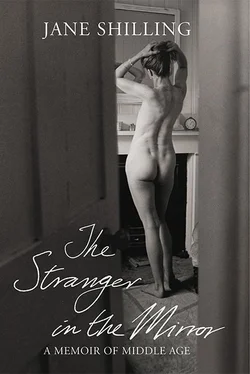At school the flimsiness of our temporal existence was impressed on us early and often. We were always being reminded, on our frequent trips to church, of the cloud of witnesses, composed of the souls of the faithful departed, that invisibly surrounded us. It seemed likely that we were breathing them in with every lungful of air, splashing in puddles of them every time it rained. And there, in the churchyard, was further evidence of the promiscuous mingling of animate and inanimate nature: all those defunct Jacobs and Hannahs and their dearly beloved children, resting in their beds of earth, patiently waiting for the glorious Day of Judgment while worms fed on the dust that once had been their talking, laughing, loving, quarrelling, embracing flesh and trees sprang from the earth where the worms tunnelled.
At some point on the dawdling, solitary daily journey home I discovered that if I repeated inside my head, ‘Who am I?’ over and over until the words lost their meaning, I could induce in myself a state, simultaneously thrilling and alarming, in which I seemed not to be me any more, as though my body belonged to someone else altogether and I (whoever ‘I’ was, if not the inhabitant of the body in which I usually dwelt) took on a separate, incorporeal being as part of the landscape that I knew so intimately.
I was the powdery rose-brick wall; the yellow-lipped purple flowers of the toadflax that grew on it; the sound of the cracked church bell as it struck the quarter, the scent of pee and lilac that rose from the primitive playground pissoir , the curve of the road as it crossed the invisible frontier that separated the ghost stories and apple orchards of school from its neighbouring realm, the place of flowering cherries, Belle et Sébastien on the television, and shepherd’s pie for tea, that was home.
It became easier and easier to think myself into this state of giddy detachment, but then I became frightened that a moment might come when I wouldn’t be able (or, even more frightening, wouldn’t want) to get back into my body and carry on with my normal life. So I stopped doing it, and once I began the journey through the examination system that would eventually take me away from home and out into the world, I lost the knack of absenting my inside self from my everyday carapace, though I kept the habit of identifying with certain places and things.
The return to them made me feel more myself. For all the years of my grown-up life during which I lived in places that I had not chosen, or in which I was unhappy, I felt as though the substance of me, worn threadbare by the abrasive surface of living, could have its liveliness restored by haunting the places where I had once felt that I belonged.
When I took to riding in my late thirties, after almost twenty years of city life, the feeling I had as a child, of becoming my surroundings, came back as though it had never subsided. The stillness that haunts hunting in wooded country, the long passages of gazing, poised between boredom and concentration, into the same narrow expanse of covert, revived the sensation – like feeling under my fingers the notes of some once-familiar piece of music – of looking with such intentness that I seemed to grasp the withheld qualities of the landscape.
Looking across the stubble fields towards the long, low, animal curve of the great greensand ridge that rises and dips like the body of a sleeping creature beside the road that leads to Charing and on to the brickish skirts of Ashford, I felt an intimacy with the lie of the land that must be something like the deep, calm affection that people harbour for their cherished old spouses or lovers of many decades.
It is easier to maintain a relationship with a landscape or an animal than it is with one’s fellow human. At the yards where I kept my mare I noticed there were often women whose capacity for love seemed perfectly fulfilled by the care they took of their horse (although some of them had partners – shadowy, taciturn figures, occasionally summoned to hitch a stubborn trailer or help chivvy a reluctant loader up the ramp before being briskly dismissed back to the golf course or the pub).
Often the horse women were so absorbed by the maintenance of their animal – the mucking out, grooming and worming, the accumulation of equine kit and the obsessive pulling of mane and tail – that they hardly had time to ride. When they did, the management of the animal’s quirks with different combinations of bit and noseband, massage and diet, afforded endless opportunities for delicious speculation, and the seductive possibility of eliminating altogether the communication gap between two individuals that is such a baffling obstacle to contentment in human relationships.
With such an imperfect record in my human love affairs, I felt keenly the attraction of perfectibility in these less complicated attachments. But although I valued whatever self-possession I had learned from the sentimental mistakes of my twenties and thirties, and didn’t mean to relinquish it carelessly now, I saw as much danger in a retreat from the battleground of love as I did in letting down my guard.
I recalled my frustration, as a haughty adolescent, with what seemed to me to be the smallness and incuriousness of my parents’ world; their contempt (born, I thought, of a narrow timidity) for what was new and strange, their disinclination to experiment with what lay beyond their established boundaries of habit and respectability.
At a certain point (I thought) they seemed to have stopped imagining themselves, to have decided that enough was enough, that their reservoirs of experience were now full enough not to need further replenishing; that they need discover no more of the world than they knew already.
In thinking this I was doubtless mistaken: they were beleaguered, at the time I was observing them with my unforgiving teenaged eye, by all sorts of strains of which I knew nothing. No wonder they clung to the known and didn’t appear to crave strangeness or adventure.
But although I, too, longed for a life of stability and calm, I thought now that I might be in less danger from the disruption of my composure than from a certain cold contraction of the heart: a narrow prudence, a cautious indisposition to love, an absence of daring, an inability to be delighted. A calcified heart is undoubtedly well protected from predators, but it is well protected from the rest of human experience as well.
In A Time to Keep Silence , his short, brilliant book on the monastic life, Patrick Leigh Fermor described the anguish of enduring what might now be called a process of detoxification from his ordinary life. Seeking somewhere quiet and cheap to stay while he completed a book, he followed the advice of a friend and sought refuge in the Benedictine Abbey of St Wandrille in Normandy.
Welcomed by the monks, with nothing to do but get on with his book, Leigh Fermor sat at his desk in a state of overwhelming gloom, imagining ‘the temperature of life falling to zero, the blood running every second thinner and slower as if the heart might in the end imperceptibly stop beating’.
Anguish gave way to restlessness, insomnia and nightmare, followed by an extreme lassitude. After which there came an onset of pure, vigorous, creative energy: the beauty and calm of the monastic way of life lost their strange austerity and became familiar, loved, enviable.
When the time came for Leigh Fermor to return to secular life, the shock of transition was even greater than that of the initial detoxification: ‘The world seemed an inferno of noise and vulgarity entirely populated by bounders and sluts and crooks. This state of mind, I saw, was, perhaps, as false as my first reactions to monastic life; but the admission did nothing to decrease its unpleasantness.’
Читать дальше












